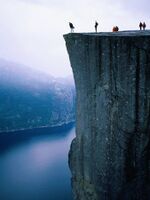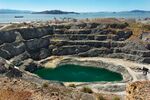Fjord
- Alert** This page contains CONTENT wtf is this crap.
A fjord (pronounced Fih-jord) is the collective name for a group of man-made sea passages that connect the sea to places really, really far inland that would otherwise be far away from the sea (e.g. Leeds, England) . It is also worth noting that Fjord is also a popular male name in both Norway and Iceland as well as being a Faroese car company. All Fjords were created by Slartibartfast.
History of the Fjord[edit]
Documented history of the fjord is vague but it is believed fjords were first invented by the Norwegians in the 15th Century to get food to small villages in and around Hordaland by boat that would otherwise involve a fortnights trek across treacherous wolf infested mountains. These fjords are often very deep (often up to 13,000ft deep) as they were later deepened to help harbour large oil tankers that would otherwise be stuck in ice around the Norwegian or Barents seas.
Norway's national sport (building tunnels) has prevailed in modern times but before the 1470's, modern tunneling techniques were not up to the present standard and the mountains of Norway were believed to be up to a third higher prior to erosion. This makes it very difficult for Norwegians to travel, hence the reason some people are still trapped in the Arctic Circle and forced to live a Bronze Age existence in the 21st Century. It is for this reason that all fjords around the world are found where it is mountainous, otherwise locals would have saved time and money by building a road or a canal instead.
If you ask anyone from Nepal, they will tell you that building a road over a mountain is fairly difficult and tunnels are even more difficult, especially when the horse pulling the cart is often afraid of the dark. However, the Bay of Bengal, the large entrance to the proposed Himalayan Fjord is still in the early stages of construction and once the Ganges is dug out along with the rest of Bangladesh, it is thought that ships will be able to provide food and various assorted essentials to Kathmandu by 2075. Blah
Building Fjords[edit]
The first step to building a fjord is creating a long dry valley, often with a large dam at the front to stop the sea pouring in as apparently it is very difficult to operate a JCB underwater. Masses of rock are then blown away by big burly Scandinavians with explosives, creating steep sided road cuttings on either side of the valley. An estimated 128,600,000 tonnes of dynamite were required to create Sognefjord, the longest fjord in Norway which took no less than 76 years to blast its 126 miles of inland valley.
In Norway, most rock that has been removed now forms kitchen worktops found around millions of homes worldwide (the blue sparkly granitey-type stuff that mums like). Once the valley has been created, all dangerous animals are allowed into the fjord before the dam is blown up, flooding the fjord which can often take several weeks for the sea to fill up properly.
Geomorphologists also believe that various large fish such as salmon eat away at the rocks to create natural shelters from the freezing open sea. This theory was developed to explain all of the little mini fjords (fjordlets) that often branch off from the main fjord channel.
BS!
Tourism[edit]
Scandinavians find it difficult to understand why people travel thousands of miles to visit Norway just to look at such a crude transport network. Despite the country’s exciting culture and oil industry museum in Stavanger, many would rather visit the bleak rain soaked fjords. One community at Lysefjord has successfully made a fortune after someone dropped a big boulder down a crack where many a tourist can be found taking photos of idiots falling off into the giant chasm below.
Places that still use the Fjord transport system:

